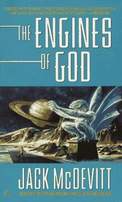
| Series: | Academy #1 |
| Publisher: | Ace |
| Copyright: | October 1994 |
| Printing: | December 1995 |
| ISBN: | 0-441-00284-6 |
| Format: | Mass market |
| Pages: | 419 |
The first Great Monument discovered was on Saturn's moon Iapetus early in mankind's exploration of space: a beautiful, apparently-representative statue of an alien figure carved out of ice and rock, with footprints matching the species of the figure leading to where the materials were taken. Twelve more Great Monuments were found in the subsequent two hundred years, all with unreadable enscriptions in the same writing system, all very different, but all clearly works of art.
The Monument Builders were not the only group of aliens discovered. Another race was found locked in a seemingly-endless world-wide conflict at a technology level prior to space flight and watched cautiously but left alone. More intriguingly, the third known alien race left only ruins on an empty planet, apparently having succumbed to extinction after millenia and untold layers of long history without ever discovering space flight. Left as an open mystery was how and why their moon featured a damaged, clearly artificial sculpture of a city, made of cubes, squares, and rectangles, "buildings" of solid rock without doors or windows, with an inscription in one of their languages.
Archeological science fiction is a theme for McDevitt. At the start, The Engines of God feels firmly within that theme, more scientific and academic than the treasure-hunting of the Alex Benedict series but with a similar puzzle-solving exploration of SF mysteries from the past. The intended terraforming of the world filled with alien mysteries to relieve Earth's overpopulation adds drama and political tension, but the focus is on digging into the past, piecing together events from archeological clues, and discovering cultures from their leavings.
However, one of the main characters of The Engines of God is Hutch, a ship pilot and not an archeologist. This isn't an accident; as the story proceeds, it doesn't stay with the archeology. The exploration set up in the first part of the book provides only a few clues in a larger mystery, and while that mystery still has an archeological feel, the plot shifts to more dramatic exploration in a classic SF mode than the sort of piecing together of clues the Alex Benedict series features.
Unfortunately, when the story moves away from the unifying theme of archeological study, no other unifying theme quite replaces it. McDevitt strings together classic hard SF scenes — surviving a starship crash, alien planetary exploration a la Star Trek and countless others, unexplained interstellar phenomena, Big Dumb Object exploration — but each scene feels oddly isolated. They share common characters and an overall plot driver, but something is off about the pacing, timing, or sense of consistent flow. I felt at times like McDevitt was dropping the reader into a short-story elaboration of some critical scene in the book, written following the SF genre tropes appropriate to that scene but unrelated to the other scenes.
Engines of God is very clearly the first book of a series, too, which doesn't help. By the end of this not-short novel, we know only the barest beginnings about the overarching threat that the series will presumably confront. Plenty happens in this book, but little of it advances the core plot to a satisfying extent. The scenes aren't bad in isolation, but the cumulative effect is scattered and slow. (And it didn't help that one of the major scenes is the sort of semi-horror alien world exploration story that Star Trek did to death and which I find predictable and mostly tedious.)
This isn't a bad book, but neither is it a good book. If it were the first I'd read of McDevitt, I'd probably put it down and not bother with the rest of the series. I liked the political in-fighting and the world-building news headlines and other documents that McDevitt scatters into the story, and some of the individual scenes are engrossing, but neither the series plot nor the main characters grabbed my attention. I'm likely to keep reading since the fourth book in the series won a Campbell Memorial award, and I know from the Alex Benedict series that McDevitt can get better as a series goes along. In isolation, though, I can't recommend this one unless you're really dying for some space exploration fiction and can't find anything else.
Followed by Deepsix.
Reviewed: 2009-05-18